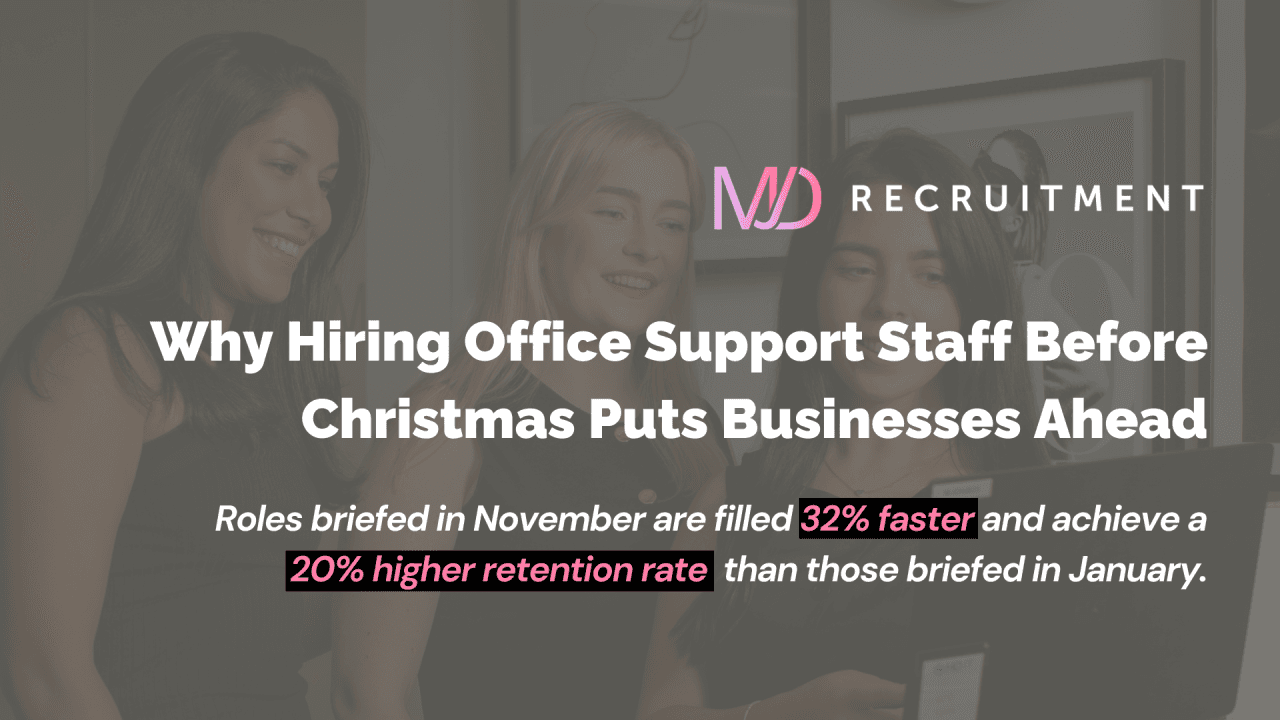What is the value of an Executive Assistant in 2025?
An Executive Assistant in 2025 adds value by acting as a trusted partner to leadership, anticipating needs, streamlining communication, and driving strategic execution across the business.
In today’s agile, fast-paced business world, the executive assistant role is more than just support—it’s a strategic asset. Whether you’re hiring an EA, redefining your expectations of the position, or pursuing this career path, understanding what an executive assistant does in 2025 is essential for maximising business impact.
Far from the outdated perception of just gatekeeping and diary management, today’s senior EAs are embedded in leadership. They anticipate, communicate, coordinate, and execute with polish. Their work influences everything from executive output to team culture.
This article explores the evolving executive assistant job description, what skills matter most, and—critically—how an executive assistant can add value at the highest levels of business.
What Does an Executive Assistant Do in 2025?
If you’re still asking, “What’s an EA?”, the answer has changed dramatically over the past decade.
An Executive Assistant in 2025 doesn’t just manage calendars. They manage energy, outcomes, and influence. They are time multipliers, project drivers, stakeholder buffers, and communication bridges. They’re involved in decision-making cycles, represent the voice of leadership in internal and external interactions, and lead operational effectiveness.
According to LinkedIn, Executive Assistants are doing 30% more strategic work today than they were just three years ago.
Executive Assistant Job Requirements Are Shifting
As the scope of the EA expands, so too do the expectations in hiring. No longer seen as “career administrators,” EAs are evaluated for behavioural strengths, cognitive agility, and their ability to perform under pressure.
Typical established Executive Assistant job requirements now include:
- 5+ years in high-level support, often with C-suite exposure
- Mastery of calendar, travel, and inbox management
- Confidence using AI tools for scheduling, summarising, and reporting
- Strong business writing and verbal communication
- High emotional intelligence and confidentiality
- Proactive stakeholder engagement
As mentioned in our 2025 Market Insight Report, more than 65% of employers now screen EAs for strategy alignment and team fit before assessing admin skills. That’s a seismic shift from previous norms.
Executive Assistant Role Description: More Than Admin
So, what’s in a modern EA role job description?
Gone are the days when this role was framed around task completion. Now, the Executive Assistant role description reflects a business-critical function—often referred to as a force multiplier or “right hand” to leadership.
A well-structured EA position description might include:
- Acting as a key point of contact for internal and external stakeholders
- Drafting communications, reports, and presentation decks
- Leading team coordination or project support
- Managing high-volume scheduling and complex travel
- Prioritising leadership’s time through workflow and meeting design
- Supporting board liaison, compliance tracking, and data integrity
This isn’t a checklist admin. It’s embedded leadership support.
Executive Assistant Tasks That Make a Difference
While task lists vary by industry and executive style, some responsibilities have emerged as universal markers of high-performing EAs.
Executive assistant tasks that add measurable value include:
- Prepping leadership for meetings with briefing packs and context summaries
- Gatekeeping access while preserving relationships
- Drafting agendas and tracking action points
- Monitoring project progress or team milestones
- Curating the executive’s communications tone and timing
- Keeping personal and professional obligations in sync
These aren’t background tasks. They are operational enablers that create clarity, flow, and progress.
What Is the Most Important Quality of an Executive Assistant?
If you’re wondering, “What is the most important quality of an executive assistant?”, it’s not typing speed or industry exposure. It’s anticipation.
The most valuable EAs are thinkers, not reactors. They ask themselves:
- “What does my executive need next?”
- “What’s missing from this workflow?”
- “What’s the risk if this detail is missed?”
“Our top-performing EA doesn’t just organise—they lead with foresight. They’re part of our leadership rhythm.”
— MJD 2025 Market Insight Report
Add emotional intelligence, discretion, and professional presence to that mindset, and you have a career EA who commands respect across an organisation.
Key Executive Assistant Skills in 2025
Support professionals at this level are defined by the breadth of their capability, not just technical mastery.
Key executive assistant skills include:
- Executive-level communication across channels and formats
- Complex calendar and inbox management (often using AI)
- Emotional intelligence under pressure
- Professional discretion and judgement
- Time and priority triage for themselves and their leader
- Systems knowledge (e.g., MS365, CRM, project management tools)
- Presentation and document prep, sometimes with AI assistance
If you’re mapping out a development plan or career trajectory, this is the baseline to aim for.
Executive Assistant Time Management: A Core Value Driver
One of the greatest contributions an EA can make is through executive assistant time management.
By shielding leaders from low-priority distractions and optimising their schedule, EAs enable higher quality thinking, stronger stakeholder relationships, and sharper decision-making.
That includes:
- Designing meetings with purpose
- Building in thinking and review time
- Flagging calendar conflicts or fatigue risks
- Managing expectations around availability
“My EA helps me work on the business, not just in it.”
— CEO, Growth-Stage Tech Firm
How Can an Executive Assistant Add Value?
The question “How can an executive assistant add value?” has never had a more compelling answer.
Today’s EAs:
- Extend leadership influence beyond the boardroom
- Translate chaos into clarity for busy executives
- Serve as cultural tone-setters and morale boosters
- Protect time, reputation, and operational momentum
- Elevate projects from planning to execution
If you’re hiring, investing in the right EA isn’t a luxury—it’s a performance accelerator.
What Is the Greatest Value of an Executive Assistant?
It’s not the task list. It’s the trust.
The greatest value of an EA lies in the unique space they occupy—between confidentiality and communication, structure and spontaneity, strategy and detail. They see what others don’t, say what others can’t, and keep everything moving when leaders are under pressure.
“We say it often—without our EA, we’d be running to catch up with our own day.”
— Group Executive, National Professional Services Firm
Final Advice for Hiring or Becoming an EA
Whether you’re shaping an EA job description, planning career growth, or hiring for this role, the key is clarity and alignment. Don’t look for task-fillers. Look for partners in performance.
At MJD Recruitment, we help employers across Sydney, Melbourne, and Brisbane find and retain high-calibre executive assistants who deliver strategic impact from day one. We know what to screen for, how to define the EA role job description, and how to benchmark for long-term success.
📞 Contact our team on 1300 251 905
🌐 Explore EA opportunities and recruitment support at mjdrecruitment.com.au





